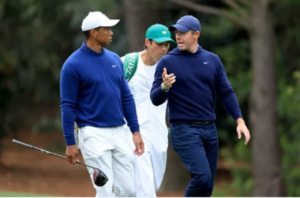Andrew “Beef” Johnston has launched a scathing critique against the PGA Tour’s Player Equity Program, arguing that the tour’s increasing emphasis on financial rewards is damaging the essence of professional golf. The controversy stems from the recent allocation of equity packages to top players, with significant sums going to icons like Tiger Woods and Rory McIlroy.

The PGA Tour, in its ongoing battle against the LIV Golf breakaway league, devised the Player Equity Program to retain its star talent. This initiative assigns equity packages based on a metric called “career points,” which evaluates players’ contributions and achievements throughout their tenure. Notably, Tiger Woods emerged as the biggest beneficiary, receiving a staggering £80 million in equity, while Rory McIlroy secured around £40 million.
These equity packages, which will vest over eight years and are likely to appreciate in value, serve as incentives for players to remain committed to the PGA Tour amidst the allure of LIV Golf’s lucrative offers. However, Johnston, a victor on the DP World Tour, condemns this financial-centric approach, questioning how it differentiates the PGA Tour from its rival.
In Johnston’s view, the PGA Tour’s adoption of the Player Equity Program signifies a departure from its purported principles of meritocracy and fair competition. Instead, it appears to reward players simply for staying loyal, perpetuating a cycle of financial focus at the expense of the sport’s integrity. He laments the transformation of golf into a realm where money overshadows on-course performance, alienating fans and detracting from the game’s essence.
Johnston’s concerns extend beyond the financial landscape to encompass the broader impact on golf’s popularity and engagement. Despite marquee events like The Masters featuring iconic players and compelling storylines, television viewership has declined—a trend he attributes to the sport’s top-heavy, money-driven narrative.
Drawing parallels with football, Johnston highlights the trend of rewarding players with exorbitant contracts based on market value rather than performance. This shift, he argues, erodes the authenticity of golf and contributes to its disconnect from fans who seek a more wholesome and genuine sporting experience.
In essence, Johnston’s critique serves as a wake-up call to the golfing community, urging stakeholders to reconsider their priorities and rekindle the spirit of the game. Amidst the allure of financial incentives and competitive rivalries, preserving the essence of golf as a sport of skill, integrity, and camaraderie remains paramount.
